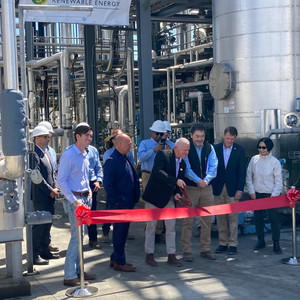BDI, Crimson Renewable Energy open California biodiesel plant

SOURCE: BDI-BioEnergy International
April 15, 2022
BY BDI-BioEnergy International
BDI-BioEnergy International has opened a next-generation biodiesel production plant in Bakersfield, California. The key innovation: the patented RepCAT technology with a recyclable catalyst. BDI-BioEnergy International is a specialist in technology development and plant construction for biodiesel from Styria, Austria.
Following successful projects in Vienna, Hong Kong and London, BDI-BioEnergy International GmbH has now brought its new RepCAT technology to the USA. In partnership with Crimson Renewable Energy Holdings LLC – the largest low-carbon biodiesel producer in the Western United States, including California – BDI has built a new biodiesel plant in Bakersfield featuring the RepCAT technology. The plant will mainly operate with waste oils and fats collected in the local region, especially from central and southern California metro areas. The feedstock comes from restaurants, industrial kitchens and food processors, and rendering facilities.
Developed in Styria, used all over the world: BDI RepCAT technology
To ensure that the biodiesel plant meets the highest standards, BDI-BioEnergy International implemented the latest technology – including the RepCAT process, which was developed and patented by BDI itself. RepCAT stands for “REPeatable CATalyst”.
Advertisement
Innovative technologies cut the environmental burden
In the USA, California has led the nation in climate change policy and strongly advocates CO2 neutrality – not least because of the untiring efforts of former governor Arnold Schwarzenegger. Now BDI has helped advance this transition with trailblazing technology for recycling waste. “As a builder of special processing plants, it’s our mission to use our innovative technologies for a better environment. We are not just developing processes for safe utilization of waste oils and fats, we are helping the world get closer to the climate targets,” says Markus Dielacher, CEO of BDI-BioEnergy International GmbH.
Maximizing feedstock flexibility with a retrofit programe
BDI’s RepCAT technology makes biodiesel production more efficient and more sustainable. Compared to conventional processes, it is exceptionally flexible in terms of the kinds of feedstocks the process can accept. This makes production more economical, because a great variety of lowest-value waste can be fully exploited.
“With this newest generation of biodiesel plant, we can respond to any changes in raw material availability and achieve the maximum possible flexibility,” said Harry Simpson, Crimson’s CEO. “BDI has been a terrific partner and its RepCAT technology is on track to produce a bit over 13-million new gallons for us per year, removing an additional 135,000 metric tons of carbon dioxide annually.”
Advertisement
This wasn’t the first project BDI did in partnership with Crimson Renewable Energy: it is a sequel to a retrofit project completed in 2016 at the first Crimson biodiesel plant. BDI supplied the technology, the key equipment and the necessary engineering services. With the second plant, Crimson’s total annual production capacity in Bakersfield is now more than 37 million gallons.
To be continued
Currently, BDI is working at full speed on further biodiesel plants using the innovative RepCAT technology for environmentally friendly disposal and upcycling of waste fats to produce high-quality biodiesel. Hermann Stockinger, CSO at BDI: "Our RepCAT technology is already being used successfully in the largest biodiesel plant in Hungary and will soon also be used in Belgium to produce sustainable fuel. The highly efficient use of local resources is an important argument for technology from Styria in this context."
Related Stories
Broco Energy on July 17 announced a new partnership with the Massachusetts Port Authority (Massport) to deliver and transition Massport's fuel tanks to renewable diesel across its various facilities.
Shell Aviation, Accenture, and Amex GBT on July 10 announced Avelia is in the process of evolving to an industry solution with independent data hosting and a multi-supplier model helping users access the GHG benefits of SAF.
The U.S EPA on July 17 released data showing more than 1.9 billion RINs were generated under the RFS during June, down 11% when compared to the same month of last year. Total RIN generation for the first half of 2025 reached 11.17 billion.
The U.S. EPA on July 17 published updated small refinery exemption (SRE) data, reporting that six new SRE petitions have been filed under the RFS during the past month. A total of 195 SRE petitions are now pending.
European biodiesel producer Greenergy on July 10 confirmed plans to shut down its biodiesel plant in Immingham, Lincolnshire, U.K. The company temporarily suspended operations at the facility earlier this year.
Upcoming Events










